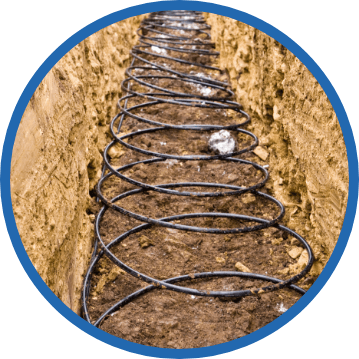When thinking about maximizing heating and cooling efficiency for a home, many homeowners consider the advantages of different HVAC options available to them. Standard HVAC systems such as electric, natural gas, and propane still make up the majority of heating and cooling systems in the U.S., but a movement toward cleaner, greener energy is beginning to catch on. Geothermal energy and geothermal HVAC systems are gaining popularity as many people realize the efficiency and low-maintenance nature of these systems when installed correctly.
What Is Geothermal Energy?
Geothermal energy is the process of harnessing energy and heat from the earth as an exchange medium rather than outside air temperatures. A geothermal HVAC system is more efficient and cost-effective than traditional HVAC systems as they are able to provide consistently warm or cool temperatures in a home. In addition, a geothermal system may also be able to provide hot water to a home, potentially saving homeowners money on energy costs and appliance maintenance over time. What do you know about geothermal energy systems? Are you happy with your current monthly energy bills and usage? This overview of the pros and cons of geothermal HVAC systems will provide you with more detailed information as you consider making the switch to clean and green.
How Do Geothermal HVAC Systems Work?
A geothermal HVAC system is comprised of three main components:
- Ground loop
- Air handling system
- Heat pump
During the winter, the water solution that is present in the ground loop absorbs heat from the ground. This warm solution then flows through your system’s series of in-ground pipes and into various rooms in your home to be used for heat. Once the warm solution enters your house, a water-to-air heat pump is able to concentrate heat energy and send it into your home via your ductwork. Warm air easily circulates throughout the house, heating and regulating temperatures.
Summer involves a reverse process of pumping excess heat out of your house and back into the ground. Geothermal systems are also able to provide hot water to a home. A desuperheater is a special device that recycles excess heat generated by the HVAC system, sending it to your home’s water heater. The combination of a desuperheater and a water heater is a very efficient way to provide hot water to a home or building.
Advantages of Geothermal heating
Geothermal HVAC systems have a number of advantages that entice homeowners to make the switch from more traditional forms of HVAC service. A few of these advantages include:
Long Lifespan
A conventional furnace has a lifespan of 15-20 years, depending on maintenance and upkeep. Homeowners are pleasantly surprised to learn that ground loop components of a geothermal system can last upwards of 50 years, with little maintenance required. Heat pump components of a geothermal system will last between 20 and 25 years with proper maintenance, with the average cost of a replacement being between $1,500-$2,500 per ton.
In contrast, furnaces and boilers require annual or semi-annual checkups and cleaning to continue working efficiently. This can add up quite quickly, given the number of times you’ll perform system maintenance over its lifespan.
Low Operating Cost
Geothermal systems have extremely low operating costs, particularly when compared to the cost of monthly shipments of fuel oil and propane that traditional systems need to function. While installation is initially more expensive, the amount of money that you’ll save over time will more than make up for it.
Improves Home Value
Installing a geothermal HVAC system can add to your home’s value. Traditional HVAC systems are thought of as more of a liability than an investment, as they depreciate in value from the moment you install and begin using them. Some geothermal companies even offer to buy back excess energy generated by your system for use in other homes and commercial buildings, so you end up with a system that pays YOU to use it.
Clean Energy
As geothermal pulls heat and energy from the earth, it is an abundantly clean resource that helps reduce carbon emissions when heating and cooling your home. You are making an individual contribution that adds to the global initiative of moving toward clean, green energy for all.
Effective on a Global Scale
Other renewable energies like wind and solar power are largely dependent on local weather conditions to be effective. Even with the best conditions, they are not as consistent and reliable as geothermal power. Geothermal heat pumps can work anytime, anywhere. Underground temperatures tend to remain pretty consistent regardless of where systems are installed, making them a reliable source for heat whether outdoor temps are over 95 degrees Fahrenheit or below zero.
Disadvantages of Geothermal HVAC Systems
With all of the advancements in geothermal technology, there are still a few disadvantages that come with its use and application in residential heating and cooling.
High Installation Cost
The intricate work of setting up a groundloop system and running it into your existing home appliances is quite expensive, costing between $30,000 and $50,000 to install. If you have the money to spend on the investment, it will pay for itself over time, but you’re likely to see the savings in monthly increments rather than lump sum rebates.
Requires Specialized Installation
One of the reasons that geothermal HVAC systems are more costly to install is that they require skilled installers and designers to do the work rather than general contractors. These technicians will evaluate and assess your property for potential design challenges, propose a plan for installation, and use specialized tools and skills to get the job done right. You can expect this to come at an additional cost.
Heat Pumps Reliant on Electricity
Despite their efficiency, the heat pump component of a geothermal system is still reliant on electricity. If you live in an area with unpredictable power sources or intermittent blackouts, you may find yourself without HVAC services and hot water from time to time.
Not Every Property Is Suited Well to Design
Properties with small square footage and design challenges may not be ideal for ground loop installation. You may not be a candidate for geothermal installation if your lawn and landscaping just won’t accommodate the space needed. As much as you’d like to take advantage of energy-efficient savings and consistent heating and cooling, you may not be able to install one on your property.
Gathering information via trusted sources for geothermal energy, such as geothermal contractors, will give you what you need to make an educated and informed decision about installation on your property. With many advancements in installation technology and operation, you may decide that the upfront cost and investment are worth the time and money needed to make geothermal HVAC systems work for you.
Need Advice? Ask the Experts!
John Henry's Plumbing, Heating, Air, and Electrical has been proudly serving valued residents of Lincoln and the surrounding areas for over 20 years. Our family serves your family with services such as heating and cooling repair, maintenance, and installation, heat pump installation and service, commercial HVAC and plumbing services, duct cleaning, sewer line repair, plumbing services, and geothermal service and installation. If you have questions about geothermal HVAC systems, we have answers and solutions for you! Contact us today for a property assessment and installation quote.

